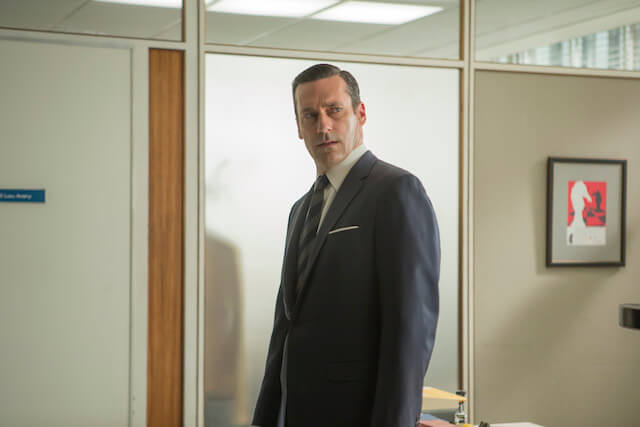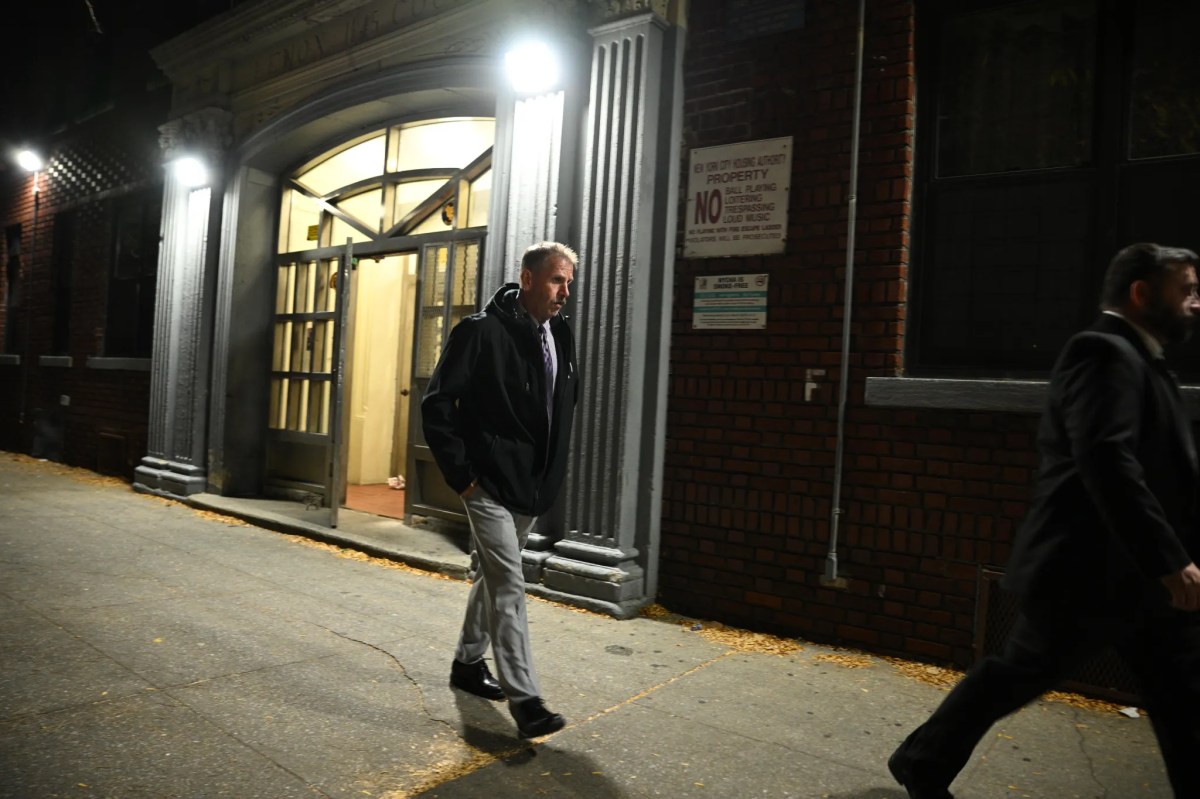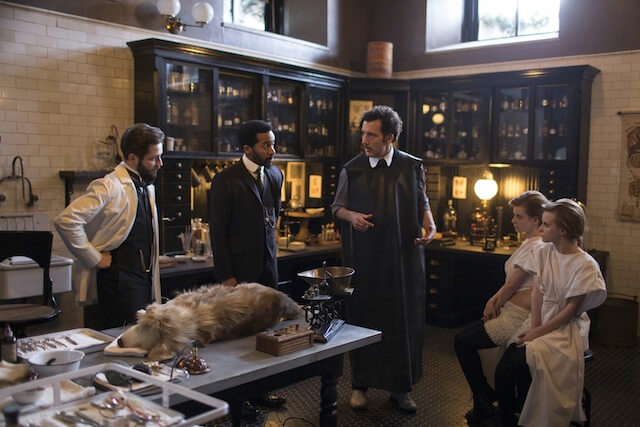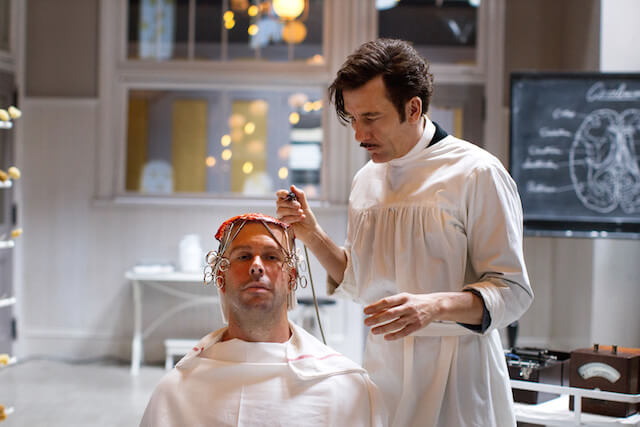‘Mad Men’ The majority of “Mad Men” coverage these days focuses on reckless, probably pointless speculation: How will it end? Will Don Draper (Jon Hamm) die? Will he find happiness? What the hell ever became of Salvatore (Bryan Batt)? But when the first episode of the second half of its seventh and final season began, another question quickly leapt to the foreground: where are we? How much time has passed since Bert Cooper (Robert Morse) passed (via Depression-era song and dance), leaving Don unsure about his future at SC&P even as he’s been reinstated as one of their top dogs? Creator/showrunner Matthew Weiner has stated that the back half of the season should feel like one, continuous story. And yet there’s obviously been a giant time hop, largely noticeable in the proliferation of mustachery. We expect Ted (Kevin Rahm) to wind up with a big honker, but Roger Sterling (John Slattery)? That white monstrosity takes up half his face. And how long does it take to make one of those happen? The year isn’t identified for sure until near the end, and only casual history buffs (or Googlers) will know for sure that it’s the spring of 1970, meaning almost a year has passed — nearly the amount of time since the end of the last half-season. (Unfortunately for the cast, who shot the whole of season seven in one foul swoop, that means they had to pretend to age about 10 months.) But its concern with time passing isn’t superficial. The entire episode was concerned, obsessed even, with aging, and time leaving people in its wake. It even opens with a scene that could have come right out of the first season: Don quietly seducing some hotcha model, purring out erotic instructions to a lady dressed only in a fur coat and unmentionables as though they were sweet nothings. (The dropping of his cigarette into his sad paper coffee cup at the moment of orgasm was a nice touch.) Turns out he’s simply leading a cattle call audition for a new client, and having too much fun doing so. Perhaps when the show started, this moment might have seemed badass — just another notch on the bedpost for an old school ladykiller on the prowl. But now, eight years in, it seems sort of sad, as is his current martial status: Don’s head nearly drops to the floor when he has to admit, late in, that he’s getting divorced — a second time. There are a fair amount of references to events from show’s beginning, mostly glaringly the sudden arrival — via one of “Mad Men”’s plain dreams, which seem real at first and thus momentarily and deeply confusing — of Rachel Menken (Maggie Siff), his first major affairee, and the first, that we know of anyway, that seemed to mean more to Don than he let on. But these are more than mere fan service callbacks, like the way “Furious 7” is dotted with nods to previous installments. Soon after Rachel has popped back into his psyche, Don learns that she has suddenly died. This shocks him, less because he deeply cared about her — they hadn’t talked in many years — but because it rocks his complacency as a man’s man plowing through another stable of stewardesses but having an unstable foundation. Perhaps the key scene in the episode found him going to her shiva, mostly in an attempt to find out what became of her. He’s surprised to learn that not only did she have leukemia, but she had two young children, and a life that, her sister assures him — as though intentionally stabbing him, since she says she knows, nudge nudge, who he is — was well-lived. While Don has stumbled through life with little to show for it, Rachel went and found a form of happiness, short-lived though it was. And Don was not remotely a part of it. All this turned the show’s use of Peggy Lee’s “Is That All There Is?” (“If that’s all there is, my friend, then let’s keep dancing”) seem less an ode to resilience in the face of tragedy and heartbreak then a depressing dirge about never finding happiness. So that’s the downer part of this “Mad Men” episode, which was otherwise comic, even joyful, even optimistic at times, and which made more-extensive-than-usual use of its goofy, time-specific score. The one with the best reason to be happy is, improbably, Peggy (Elisabeth Moss), who might have found the right guy, finally, maybe — and, hey! It’s Brian Krakow from “My So-Called Life.” It might have taken awhile for ’90s kids to recognize Devon Gummersall as the ex-lawyer set up with Peggy, who seems at first to be boring, shy and wimpy; Peggy’s initially majorly turned off when he won’t return the veal that’s been delivered to him by mistake. But she suddenly finds herself warming to him, partially thanks to Galliano, and is suddenly proposing an impromptu jaunt to Paris. Then again, Peggy has a habit of falling for guys who seem exciting at first and turn out to have some kind of crippling flaw, like a wife and kids. Alas, Peggy was involved in the night’s ugliest moment: her casual slut-shaming of Joan (Christina Hendricks). Just as the episode’s first scene harkened back to the first season, the bros who taunted Joan and Peggy at a meeting with frattish cracks about their bods and such seemed like the crawled out of the pilot — the one that now seems overly broad compared to the more subtle critique of the distant past in retrospect. But the moment Peggy and Joan share in the elevator after is as much about our time as then. While Joan is more incensed than she’s ever been before (“I want to burn this place down”), Peggy effectively says the treatment was her fault because of how she dresses. Peggy doesn’t mean that to be hateful; it clearly stems from her anger that Joan, post-merger, is loaded while Peggy is not. Still, that Peggy thinks nothing of saying that speaks to how the problem of blaming the victim for sexual harassment has never really changed and lies much deeper in our social fabric than we’d like to admit, even among those of us who aren’t sexist pigs. It’s always been easy to raise the feminist flag for Peggy; this was a moment that reminded us Joan may be the more progressive hero. Token stray observations:
Season 7, Episode 8
Rating: A-
— “Mad Men” loves period details, especially for things that have been lost to time. The big one here was the in-person voicemail service Don uses, wherein a live human being rattles off his messages to him. Now that’s a crap job that happily died.
— Weiner is apparently interested in mysticism and whatnot, and there’s a bit of that here, ladled out in two big glops: First, Don dreams of Rachel right before learning she has died; then one-eyed Ken Cosgrove (Aaron Staton) is told by his wife he should quit his job — to become a writer — the day before he’s fired. Still, it’s amusing that Weiner, who wrote the episode, undercuts this, first by having Ken overexplain the coincidence — it’s like it was written! which it was! — then by having Don’s latest brief fling (a sour, Jon Dos Passos-reading waitress played by Elisabeth Reaser) tell him that he probably dreams of Rachel all the time, not just that once. It’s we who see connections, not someone planning them for us.
— Stan’s (Jay R. Ferguson) beard makes him look more Zach Galifianakis-y than ever.
TV Recap: ‘Mad Men,’ Season 7, Episode 8: Peggy slut-shames Joan

AMC
Follow Matt Prigge on Twitter @mattprigge
























